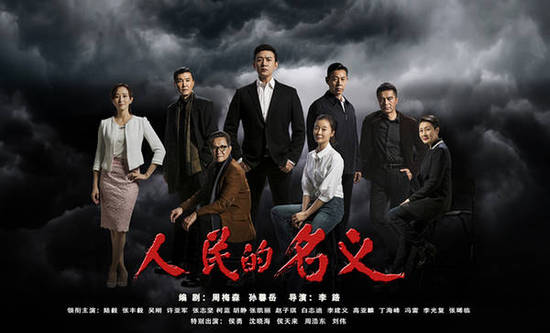China laps up glossy TV corruption drama
中國華麗上演反腐大劇,廣受歡迎
In The Name of The People is the latest piece of propaganda aimed at portraying the government's victory in its anti-corruption campaign. The series has gripped millions of viewers across the country. In The Name of the People chronicles the internal power struggle of the Chinese Communist Party in the fictional city of Jingzhou, featuring stories about Chinese politics that are often talked about but never seen on mainstream television.
《人民的名義》是一部旨在宣揚政府反腐運動勝利的最新電視連續劇,已經吸引了全國數百萬觀眾的關注。該劇講述了中國共產黨在虛擬城市京州的內部權力斗爭,其中涉及了那些經常被談論、卻從未在主流電視上展現過的有關中國政治生態的故事。
What makes In The Name of the People remarkable is not just how frankly it depicts the ugly side of Chinese politics, but that it also has the blessing of the country's powerful top prosecutors' office. Viewers have been lapping it up. "This TV drama feels so real. It really cheers people up," one viewer wrote on social media network Weibo.
《人民的名義》深受矚目的原因,不僅在于其坦率地揭露出了中國政治丑陋一面,同時也在于它蘊含著國家最高檢察機關懲治腐敗的強大決心。觀眾們紛紛拍手叫好,一名觀眾在微博上寫道:“這部電視劇感覺很真實,真的非常振奮人心。”

Who's who in China's hit TV show
中國熱門電視劇人物大解析
侯亮平
The tall and handsome chief investigator and hero of the show. He is played by Chinese heartthrob Lu Yi, whom netizens have criticised for his awkward acting, particularly in scenes with his screen wife. "Are they a model couple or a fake couple?" complained one Weibo commenter.
一位高大英俊的首席檢察官,也是本劇的主角。他的扮演者是中國的萬人迷陸毅。然而他在本劇中尷尬的表演卻遭到了網友們的批評,尤其是他和他的銀幕妻子演對手戲的部分。“他們是模范夫婦還是假夫妻?”一位微博用戶抱怨道。
Li Dakang
李達康
The blunt party chief obsessed with GDP growth and rising political star who likes to chastise his subordinates. Veteran actor Wu Gang rose to fame with this role - viewers now regularly make online memes featuring his character.
一位癡迷于GDP增長的黨政領袖,也是一位性格耿直、喜歡責難下屬的正在崛起的政治明星。資深演員吳剛憑借著這一角色而聲名鵲起——現在網上盛傳的“達康書記” 表情包,就是觀眾們根據他在劇中的角色而制作的。
The show's screenwriter, Zhou Meisen, is a seasoned writer of anti-corruption fiction. He said he aimed to show that corrupt officials were not all "monsters" and were real people—but at the end of the day, the good people always win.
這部劇的編劇周梅森是一位老練的反腐小說作家。他說,他的目的是要展現并不是所有的腐敗官員都是“怪物”,他們其實都是真實存在的人;但終歸,正必勝邪。
People need no empty talk
人民不需要空談
The popularity of the anti-corruption-themed drama In the Name of People can be attributed, to a large extent, to its echoing people's anger at corrupt officials, and those officials who have no motivation to work for the people or do bad things under the pretext of serving the people, and their admiration for those that have the courage to fight corruption.
在很大程度上, 這部反腐題材電視劇的流行可以歸因為其深深引發了觀眾的共鳴。一方面,它釋放了人民對腐敗官員的憤怒, 對那些無所作為和打著“為人民服務”的旗號干壞事的官員的憤怒;另一方面,該劇也召喚起了觀眾對那些有勇氣打擊腐敗的人的崇敬之情。
The drama features two types of officials; those who wholeheartedly serve the people and those who are preoccupied with pursuing their own interests by embezzling money and lining their own pockets. For example, such negative characters as Zhao Dehan, Ding Yizhen, Zhao Lichun and others, always talk about the people, but what they are obsessed with is pursuing their own interests in the name of the people.
這部戲主要描繪了兩種類型的官員: 一種是全心全意為人民服務的人,另一種是那些為了謀求私利而貪污受賄的人。后者例如趙德漢、丁義診、趙麗春等人,他們總是嘴上談論著人民,但實際上卻癡迷于假借人民的名義去追求自己的利益。
The stories in the TV series are based on real people and incidents,so that they reflect the experiences of ordinary people. Most people have encountered corrupt officials like those in the show. For many corrupt officials, "serving the people" is a phrase to be used when needed. Song Wenqi, a former health official in a county of Chongqing,also expressed his desire to continuously serve the people when appealing for exemption from criminal responsibility for accepting bribes.
該劇講述的故事都是基于真實人物和事件改編的,所以它們反映了普通人的經歷。大多數人都遇到過像劇中描繪的那樣的腐敗官員。對于許多腐敗官員來說,“以人民的名義”僅僅是一句空話。比如宋文琦(音譯)曾是重慶市某縣的一名衛生官員,他一面表達著自己不斷為人民服務的愿望,一面卻在呼吁豁免接受賄賂的刑事責任。












